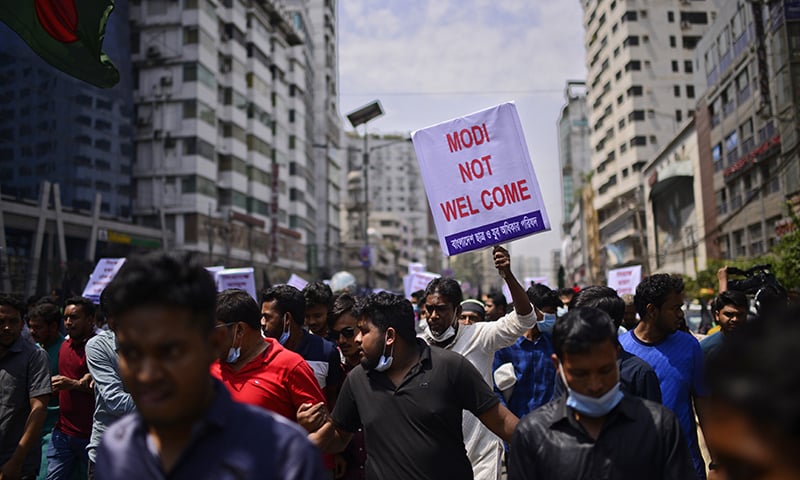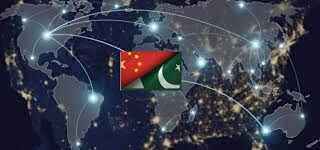
Shafiqul Islam
Dhaka, Bangladesh — In celebration of the birth centenary of the founding president of Bangladesh, Sheikh Mujibur Rahman, the country’s incumbent government led by his daughter Prime Minister Sheikh Hasina is holding a 10-day-long celebration gala in Dhaka. The gala coincides with the golden jubilee of the independence of Bangladesh in 1971.
Leaders from some countries including China and Canada have sent their congratulatory video messages to the gala, while several South Asian leaders have delivered speeches on the occasion. Though there is no opposition about the visits of other leaders, the news of the visit of Indian Prime Minister, Narendra Modi, has triggered huge protests across Bangladesh.
New Age, a leading English daily of Bangladeh has reported that at least 80 people were injured as activists of different Islamist parties locked in a clash with police and ruling Awai League activists in Baitul Mukarrom National Mosque area in Dhaka after Jumma prayer on Friday.
Despite the presence of a huge number of police in the mosque area, the protesters, immediately after the jummah prayers at the Mosque, tried to bring out a procession denouncing Modi’s visit.
The English daily also reported that at least four people were killed and several others were injured in a clash between protesters and police in Hathazari area of Bangladesh port city, Chattogram, on Friday. The clash broke out when the protesters reportedly launched a demonstration in the area and vandalised Hathazari police station protesting at Indian prime minister’s visit to Bangladesh.
Upon the news of Indian prime minister’s visit, people from all walks of life have been staging protests in the capital for several days. During the demonstrations, they have been chanting anti-Modi slogans and demanding their government to discard the visit. They were voicing rage saying that Indian border force is killing innocent Bangladeshis along the borders almost every day and that Modi has no rights to step into the territory of Bangladesh.
Though major political parties of Bangladesh have yet to announce any programmes in favor of or against the visit, their right and left allies have continued demonstrating on demand for cancelling the tour.
Hefazat-e-Islam Bangladesh, one of the most influential religious groups of the country, says that Narendra Modi is responsible for the persecution of Muslims in India and that they will not welcome him to Bangladesh. A number of leftist groups are separately protesting against the visit saying that Modi is coming to Dhaka to please the ruling party, which is not desirable and acceptable in any way.
Hefazat-e-Islam leader Abdur Rab Yousufi said the man, Narendra Modi, had his hands in torturing Muslims in Gujrat when he was the chief minister of the state. Later, his hands have repeatedly been stained with the blood of Muslims across India after he became prime minister of the country. In such a situation, around 90 percent of Bangladeshis can’t welcome him to our sacred motherland. In the past, Islamist groups also shown anti-Modi stance on different issues such as the beating of people for eating beef in India, the NRC and the riots in Gujarat. Many Islamist organizations then staged large-scale protests all over Bangladesh.
Fatema Tasnim, a leader of the Bangladesh Women’s Rights Council, says, “Modi’s visit is not desirable at all. Today we are destitute due to paying so-called debt of our independence to India during the last 50 years. We have nothing more to pay them as gratitude.” The women’s rights leader called upon Narendra Modi to strengthen bilateral ties with the people of Bangladesh instead of a single party of the country.
A huge number of students have continued their demonstration on Dhaka University campus in the capital braving all kinds of suppressive measures by the government forces. They have also merrily joined the anti-Modi chorus demanding the cancelation of his visit to Bangladesh.
Analysts are of the view that Modi is coming to Bangladesh to realize several goals including deepening bilateral ties with Dhaka and wooing voters of the West Bengal in the state assembly polls by visiting a special sect of Hindus in rural Bangladesh, Matua, as a huge number of voters of the sect live in the West Bengal and other parts of India.
On the first day of his visit, Modi is scheduled to attend the India-Bangladesh highest level bilateral meeting, and the birth centenary celebration gala at the National Parade Ground in Dhaka. During the visit, Modi and Hasina will discuss curbing illegal trade and smuggling along the border by increasing the number of border huts between the two countries.
The Indian prime minister is likely to wrap up his visit by paying tribute to the founding president of Bangladesh at the Bangabandhu’s mausoleum in Tungipara, Gopalganj. On the same day, he will visit the temple of Matua sect in Orakandi of the same district. He will also worship at the Jessoreswari temple in Shyamnagar of Satkhira district on the following day. Political analysts think that, by doing so, Modi wants to win over the hearts of voters of the Matua sect in West Bengal.
Shantanu Tagore, a Bangladeshi lawmaker and member of the Matua community, will reach Orakandi a day earlier of Modi’s visit. The Bangladeshi lawmaker will be accompanied by some leaders and workers of the ruling party of Bangladesh. Wrapping up his Bangladesh visit, Modi will enter Kolkata via Petrapole-Benapole land port without returning to Dhaka.
It may note that Bangladesh has some long-lasting irritant issues with India. People of Bangladesh are upset with India for not signing the Teesta River Water Treaty, though Bangladesh has already offered India corridors and transits on the latter’s demand. The people also want to see India stop border killings, settle water related issues of common rivers between the two nations. Bangladeshis think India as a ‘chicken-hearted’ great neighbor as it has unilaterally taken water from Feni River of Bangladesh, but not giving water of Teesta River to Bangladesh.
Finally, Modi can visit Bangladesh with the help of his protégés in the incumbent regime in Dhaka; He can also avoid the wrath of people of Bangladesh during the tour. But it will never be a success unless India resolves the irritating issues with Bangladesh paying heed and respect to the wills of the people of Bangladesh and strengthening ties with the people instead of a single party.
Shafiqul Islam is a senior Bangladeshi journalist and political analyst. The opinions expressed here are those of the writer and do not represent the views of Diplomag Magazine



































































































